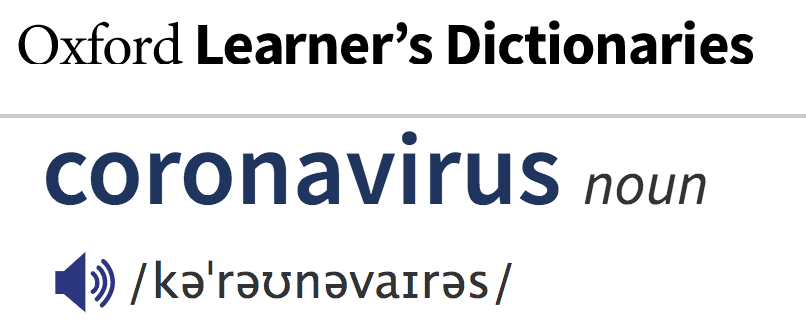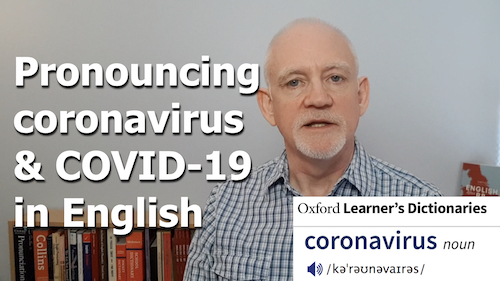Coronavirus and COVID-19
Unfortunately, the words coronavirus and COVID-19 are among the most commonly used nowadays, and several of the people I teach online have asked me about their pronunciation. Specifically, how should these words be stressed? Here I try to give a succinct answer.
First let’s look at COVID-19. Expressions of this type ending in numbers generally have the main stress on that number. Examples would include
Air Force One
mp3
high five
Route 66
the G8
and also COVID-nineteen.
(Most speakers use the GOAT vowel in the first syllable of COVID, as in over, but a few British speakers use the short LOT vowel as in coffee.)
Coronavirus is a compound noun, made up of two other nouns, corona (Latin for ‘crown’) and virus. English compound stress is notoriously tricky, but the basic rule is for the main accent to go on the first word:
airport
seat belt
history test
interest rate
and coronavirus. (As far as pronunciation is concerned, it doesn’t matter whether compounds are written with a space or not. Indeed some are written variably: seat belt, seat-belt, seatbelt.)
This compound stress makes English different from many other languages, which would make the second word more prominent: coronavirus. Here’s an example of a BBC newsreader clearly putting the main stress on the first part:
The UK’s Chief Scientific Adviser says the coronavirus…
Several dictionaries show the English stress pattern, e.g. the Oxford Advanced Learner’s Dictionary:
 and the CUBE dictionary, which I co-edit:
and the CUBE dictionary, which I co-edit:
 (Stress, of course, is assigned to a syllable rather than to a whole word; the primary stressed syllable of corona is the second syllable.)
(Stress, of course, is assigned to a syllable rather than to a whole word; the primary stressed syllable of corona is the second syllable.)
Numerous illnesses have names which are compounds in English, such as
hay fever
flu virus
chicken pox
If, on the other hand, the first word is an adjective rather than a noun, then generally this is a phrase rather than a compound, and it’s the noun that will be pronounced more strongly:
Spanish flu
acute appendicitis
nervous breakdown
There’s a parallel difference between cell phone and mobile phone. Cell is a noun, so cell phone is a compound. Mobile is an adjective, so mobile phone is not a compound.
(There are also cases of early-stressed adjective-noun compounds, like greenhouse and yellow fever. Note that in these cases the colour word has a specialized meaning and does not function in a straightforwardly descriptive way: a greenhouse is not itself green, and yellow fever is not itself yellow.)
If you’ve been following the English-language news, you may sometimes have heard native speakers saying coronavirus, with the main stress on virus. Typically this happens when the word has already been used several times in the immediate context – which, sadly, is very common at the moment. Shifting the main stress away from corona- signals that the word is ‘given information’, or already ‘on the mind’; it also introduces an element of phonetic variety. For example, here is the first use of the word coronavirus in the headlines at the beginning of a BBC news bulletin:
…to shield them from the coronavirus
Later in the same bulletin, this correspondent deaccentuates corona-:
…treating patients with coronavirus
Nonetheless, if you use this word in English, it will always sound correct if you use the normal compound stress, as indicated in the dictionaries above, coˈronavirus.
Please take care and try to keep yourself and others well.


Geoff, what a great set of resources you referenced, both of which I hadn’t heard of before—CUBE and YouGlish! I immediately ran off to the Voice and Speech Trainers Association (VASTA) Facebook group, and the Knight-Thompson Speechwork group, and sang the praises of what will likely become a very helpful set of resources for accent coaches and voice teachers creating resources for actors in training. I wish I had known about them sooner. I’m also eager to know more about the Accents features of CUBE, aspects of which I believe the site seems to imply may be “coming soon”. Perhaps you could do some blog posts about that here, too? I found the CUBE introductory video to be most helpful. Thank you for that.
Thanks for the kind words, Eric. The CUBE intro video only goes so far, so I could talk about it more in new blog posts/videos. My co-editor Péter and I would love to develop it further, but as you can imagine such things are always very time-consuming – and in this case un-remunerated!
Thank you Geoff, for this sensible explanation of compounds. For non-native speakers, it is difficult to remember the million rules we find in phonetics books. It is even more difficult to make a selection to teach Spanish speakers. This short and sweet approach is clear and full of illustrative examples to clarify our selection when stressing compounds.
I have seen most non-native speakers of English stressing virus instead of stressing corona.
Thank you for sharing this information with us.
Hi Geoff. The Consultant I work with pronounces ‘COVID’ with a short ‘o’, as in ‘hot’. I thought it was pronounced with a diphthong, as in ‘show’. Who is right?
Hi Sophie. Yes, I’ve heard quite a few people using the short LOT vowel in COVID, but I’m sure the GOAT diphthong is far more common. In phonetics and linguistics we consider the right pronunciations of words to be the ones that people actually use, and if a substantial minority of people use a variant it’s hard to call it wrong. So COVID is a bit like “either” or “economic”, but certainly the GOAT pronunciation predominates.
Ah, shame (for me!!). Thanks for your excellent explanation!